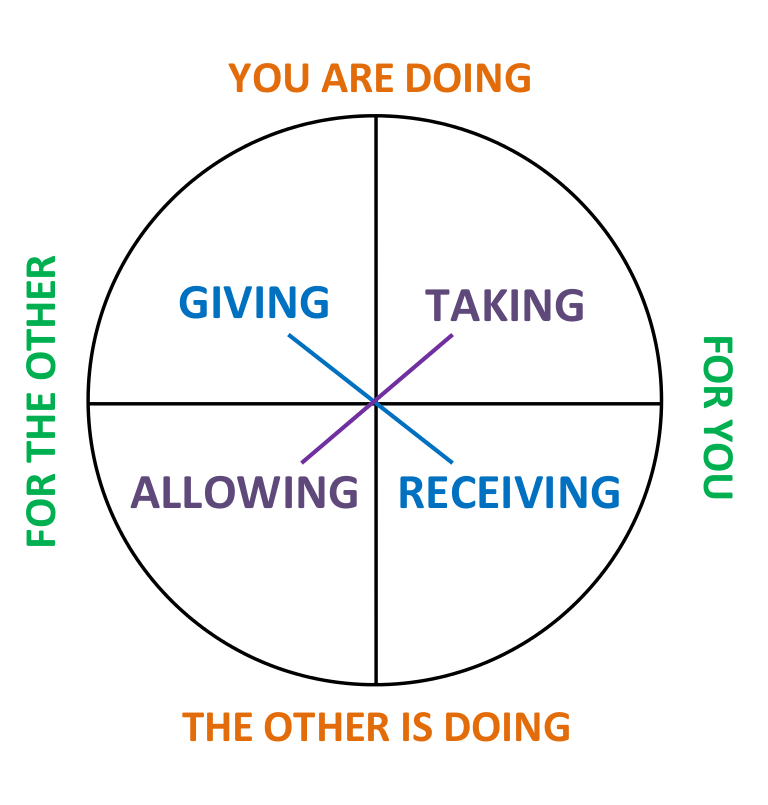The Wheel of Consent: A Framework for All Relationships

The Wheel of Consent, developed by Dr. Betty Martin, is a powerful tool for understanding and navigating interactions, originally designed for sexual relationships but with profound applications in all areas of life. The model goes beyond a simple "yes or no" to consent, clarifying who is doing an action and for whose benefit, creating four distinct quadrants of interaction: Giving, Taking, Receiving, and Allowing. This framework provides a language for more ethical and conscious interactions, shedding light on power dynamics in every context.
Beyond the Bedroom: Power Dynamics in Society
While rooted in intimacy, the Wheel of Consent is vital for understanding societal power structures and human rights. Misuse of power in society can be seen as a violation of the Wheel's principles. For example, Taking without consent is at the heart of most social injustices, such as exploitation and colonialism, where one group takes resources or labor from another without their full and conscious agreement. Allowing is a powerful concept in the context of human rights, where citizens grant power to their government on the condition that their fundamental rights are respected. When these boundaries are violated, citizens are no longer "allowing" that power, giving them a foundation for protest and demanding justice. The Wheel helps us see that these dynamics are not just about "good vs. evil" but about the intentional, or unintentional, misuse of a core ethical framework.
BDSM as a Tool for Understanding the Subconscious
The BDSM community, often misunderstood, provides a unique and powerful laboratory for exploring power dynamics. When practiced safely and ethically, BDSM is built on the pillars of communication, trust, and enthusiastic consent. Dynamics like "topping from the bottom" and "pleasure dominant" show that power is not a simple, one-way street. These interactions can be a mirror for our subconscious, revealing how we give and take power in daily life. For instance, a person who enjoys a submissive role might be exploring a desire to let go of control, a dynamic that might also influence how they navigate professional or family relationships. By consciously and safely engaging with these dynamics in a consensual setting, individuals can gain a deeper understanding of their own needs and boundaries, which in turn influences their interactions in society at large.
Regaining Autonomy After Abuse
For survivors of sexual abuse, the Wheel of Consent can be a crucial tool for healing. Abuse is, by its very definition, an experience of having one's body and agency taken without consent. This can lead to a lasting feeling of powerlessness and a disconnect from one's own desires and boundaries. By working through the quadrants of the Wheel of Consent, a survivor can begin to re-establish a sense of ownership over their body and choices. Understanding the difference between giving, taking, receiving, and allowing can help them reclaim their right to say "yes" to what they want and "no" to what they don't, thereby rebuilding their sense of autonomy and safety. The Wheel empowers individuals to consciously decide how they want to interact with others, helping to restore their sense of self after a violation of their personal boundaries.
Dr. Betty Martin has a book that is a great resource for understanding the Wheel of Consent. It is titled "The Art of Receiving and Giving: The Wheel of Consent." The book guides readers through her framework and offers practices to help them recover the ability to notice what they want and set clear boundaries. While the practices are often based on exchanges of touch, the book explains how the principles extend to social issues of equality and justice, just as we discussed.
The School of Consent (SchoolofConsent.org): This is the main hub for the Wheel of Consent. You'll find information about the model, upcoming workshops, trainings for professionals, and various resources. It is the best place to find official, authorized content related to her work.
https://www.schoolofconsent.org/
